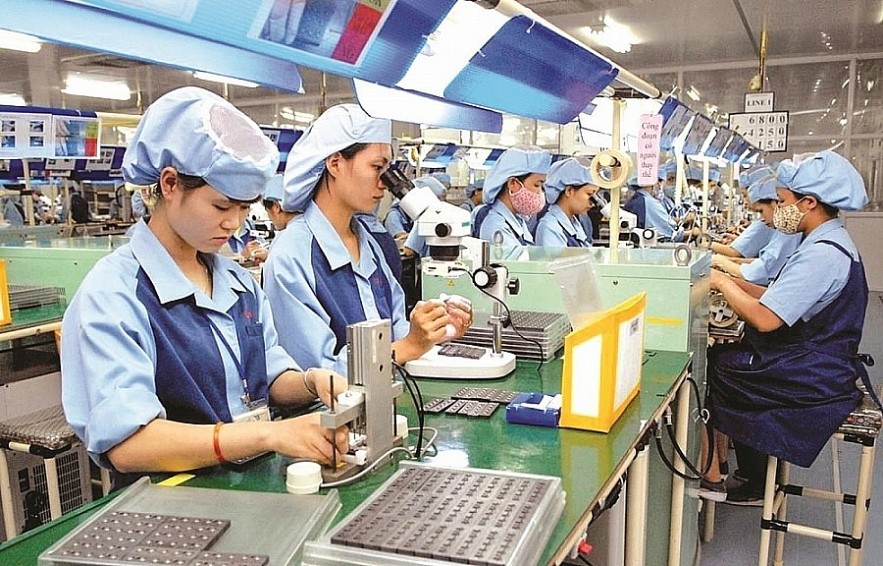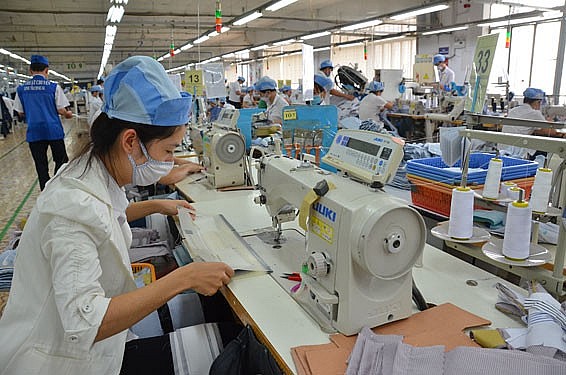 |
| Vietnamese supporting industry enterprises participate in the global supply chain. Photo: congthuong.vn |
Joining the supply chain
Recently, some large FDI enterprises have come to Dien Quang high tech company limited to buy goods. Tran Ba Linh, senior operations manager of Dien Quang company – one of the manufacturing enterprises in the electronics industry, said that before buying, enterprises have come to the company to inspect, evaluate and control the quality of goods.
Currently, the company is looking for opportunities to cooperate with domestic enterprises to expand its supply sources to participate more deeply in the global supply chain.
Along with the supply chain shift of multinational corporations to Vietnam, many giants in the manufacturing and service industries such as Samsung, Panasonic, LG, Bosch, and Marsk are continuing to look for equipment suppliers in Vietnam.
Products of Vietnamese enterprises meet the standards of these giants to join the global supply chain.
According to the assessment of Industry Agency, Ministry of Industry and Trade, Vietnam currently does not have a leading role in the industry. However, up to now, about 30% of supporting industry enterprises have joined the global supply chain and value chain.
In the textile, leather and footwear industry: 64% of supporting industry enterprises supply to the domestic market (of which 3% supply to FDI enterprises), 9% export and 27% supply to both markets.
In the rubber, plastic and chemical industries, the number of enterprises supply to the domestic market accounts for 52%, for the foreign market 4%, the remaining 44% supply to both markets.
In the electronics industry, 44% of enterprises supply to the domestic market (of which 22% supply completely for FDI), 16% supply to the foreign market, and 40% of supporting industry enterprises supply both domestic and foreign markets.
 |
| Photo: Tan Thanh |
In the mechanical and automotive industries: 83% of enterprises supply for the domestic market, only 3% of enterprises have revenue entirely from export and 14% of enterprises have revenue from both markets.
FDI enterprises have also made positive changes in using suppliers. They pay more attention to the supply from Vietnamese enterprises.
They are also gradually reducing their dependence on suppliers from third countries compared to 5 years ago.
Only 26.8% of FDI enterprises said they used a third-party supplier in 2020, compared with 39% in 2016. This shows that FDI enterprises are shifting to using Vietnamese suppliers.
Mary Tarnowka, executive director of the American Chamber of Commerce (AmCham) in Vietnam, said that US businesses are increasing the use of supplies from Vietnamese enterprises.
Among 500 US companies surveyed, 40% chose and considered Vietnamese supporting enterprises to add to the global supply chain.
Support for businesses
The world’s major manufacturing corporations operating in Vietnam are stepping up their search for local suppliers to increase the localization rate. However, at present, the ability of domestic enterprises to respond is still limited by the strict requirements to participate in the supply chain of manufacturing enterprises.
Do Phuoc Tong, head of Ho Chi Minh City Electromechanical Business Association, said the resources of Vietnamese businesses are currently not large.
Although some businesses have boldly invested resources, the quantity is still too small compared to the needs of the current economy. Therefore, the State needs to have policies to support businesses.
The State needs to have more preferential policies for businesses to invest in the supporting industry, such as tax incentives, credit incentives, or policies to encourage businesses to invest in this field.
Currently, the Ministry of Industry and Trade has been cooperating with Government agencies of other countries (RoK, Japan, Sweden, Switzerland, UK), international organizations and some large multinational corporations (such as Samsung). This is to implement cooperation projects to improve domestic supporting enterprises, strengthen the connection of domestic enterprises with global production chains.








